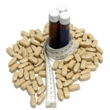Background
- The main function of L-carnitine is to transfer long-chain fatty acids in the form of their acyl-carnitine esters across the inner mitochondrial membrane before beta-oxidation. In humans, it is synthesized in the liver, kidney, and brain and actively transported to other areas of the body. For example, 98% of the total body L-carnitine is confined to the skeletal and cardiac muscle at concentrations approximately 70 times higher than in the blood serum.
- Supplementation may be necessary in rare cases of primary carnitine deficiency, which may be caused by a defect in carnitine biosynthesis, a defect in carnitine active transport into tissue, or a defect in renal (kidney) conservation of carnitine. Known conditions of secondary deficiency of carnitine (insufficiency), in which L-carnitine is effective, include chronic stable angina and intermittent claudication characterized by distinct tissue hypoxia (low oxygen levels). Another condition that may benefit from carnitine supplementation is decreased sperm motility.
- Although use in preterm infants suggests carnitine supplementation may aid in maintaining or increasing plasma carnitine levels and possibly weight gain, carnitine is not routinely added to preterm total parenteral nutrition (TPN). However, soy-based infant formulas are fortified with carnitine to levels found in breast milk.
- In 1986, the U.S. Food and Drug Administration (FDA) approved L-carnitine for use in primary carnitine deficiency. D-carnitine or DL-carnitine may cause secondary L-carnitine deficiency and should not be used.
References
- Bazzato G, Coli U, Landini S, et al. Myasthenia-like syndrome after D,L- but not L-carnitine. Lancet 5-30-1981;1(8231):1209.
View Abstract - Bazzato G, Mezzina C, Ciman M, et al. Myasthenia-like syndrome associated with carnitine in patients on long- term haemodialysis. Lancet 5-12-1979;1(8124):1041-1042.
View Abstract - Benvenga S, Ruggeri RM, Russo A, et al. Usefulness of L-carnitine, a naturally occurring peripheral antagonist of thyroid hormone action, in iatrogenic hyperthyroidism: a randomized, double-blind, placebo-controlled clinical trial. J Clin Endocrinol Metab 2001;86(8):3579-3594.
View Abstract - Bohmer T, Bergrem H, Eiklid K. Carnitine deficiency induced during intermittent haemodialysis for renal failure. Lancet 1-21-1978;1(8056):126-128.
View Abstract - Casciani CU, Caruso U, Cravotto E, et al. Effect of L-carnitine on lipid pattern in haemodialysis. Lancet 12-13-1980;2(8207):1309-1310.
View Abstract - El Beshlawy A, Abd El Raouf, Mostafa F, et al. Diastolic dysfunction and pulmonary hypertension in sickle cell anemia: is there a role for L-carnitine treatment? Acta Haematol. 2006;115(1-2):91-96.
View Abstract - Ellaway C, Williams K, Leonard H, et al. Rett syndrome: randomized controlled trial of L-carnitine. J Child Neurol 1999;14(3):162-167.
View Abstract - Holme E, Greter J, Jacobson CE, et al. Carnitine deficiency induced by pivampicillin and pivmecillinam therapy. Lancet 8-26-1989;2(8661):469-473.
View Abstract - Jirillo E, Altamura M, Munno I, et al. Effects of acetyl-L-carnitine oral administration on lymphocyte antibacterial activity and TNF-alpha levels in patients with active pulmonary tuberculosis. A randomized double blind versus placebo study. Immunopharmacol.Immunotoxicol. 1991;13(1-2):135-146.
View Abstract - Lacour B, Di Giulio S, Chanard J, et al. Carnitine improves lipid anomalies in haemodialysis patients. Lancet 10-11-1980;2(8198):763-764.
View Abstract - Maebashi M, Kawamura N, Sato M, et al. Lipid-lowering effect of carnitine in patients with type-IV hyperlipoproteinaemia. Lancet 10-14-1978;2(8094):805-807.
View Abstract - Persico G, Amato B, Aprea G, et al. The early effects of intravenous L-propionyl carnitine on ulcerative trophic lesions of the lower limbs in arteriopathic patients: a controlled randomized study. Drugs Exp Clin Res 1995;21(5):187-198.
View Abstract - Sima AA, Calvani M, Mehra M, et al. Acetyl-L-carnitine improves pain, nerve regeneration, and vibratory perception in patients with chronic diabetic neuropathy: an analysis of two randomized placebo-controlled trials. Diabetes Care 2005;28(1):89-94.
View Abstract - Singh RB, Niaz MA, Agarwal P, et al. A randomised, double-blind, placebo-controlled trial of L-carnitine in suspected acute myocardial infarction. Postgrad.Med J 1996;72(843):45-50.
View Abstract - Thomas S, Fischer FP, Mettang T, et al. Effects of L-carnitine on leukocyte function and viability in hemodialysis patients: A double-blind randomized trial. Am J Kidney Dis 1999;34(4):678-687.
View Abstract







